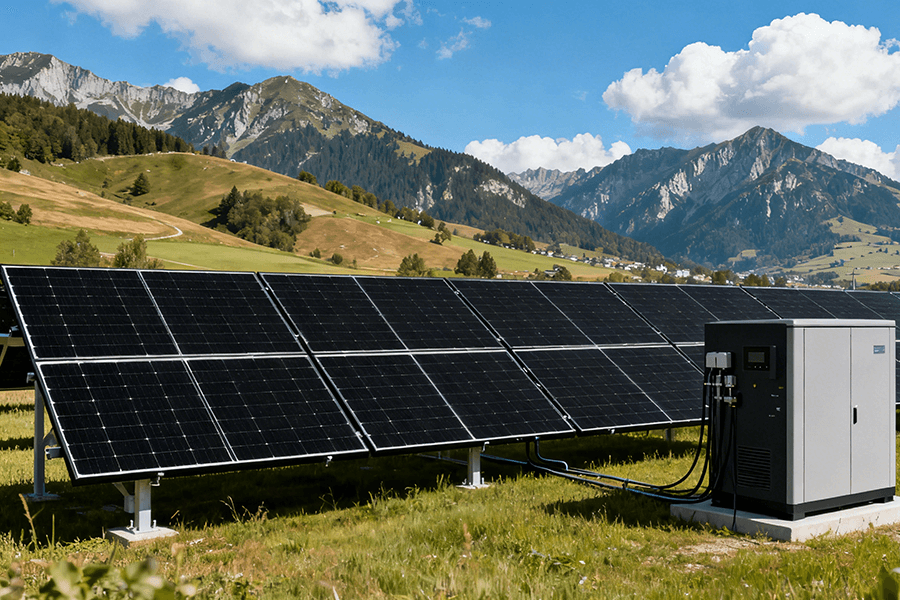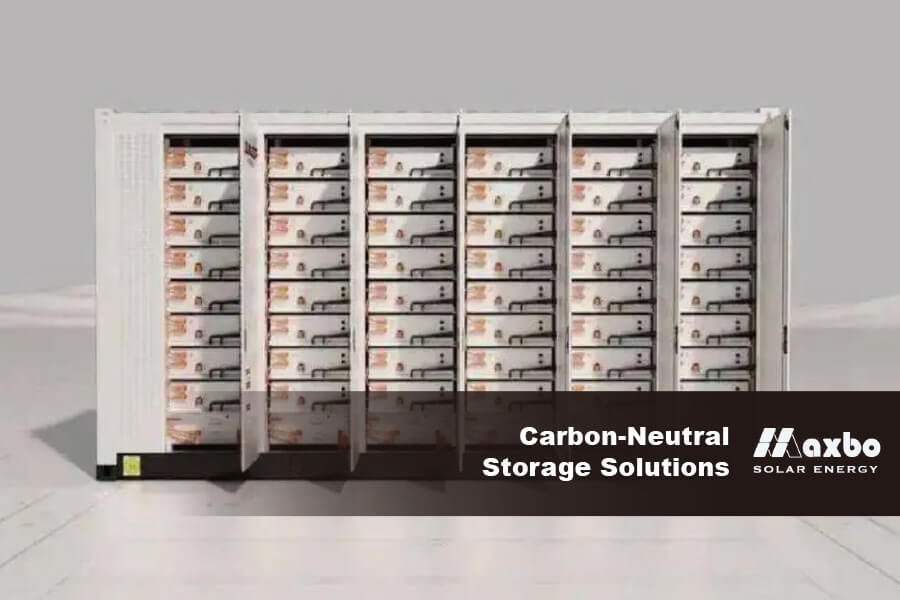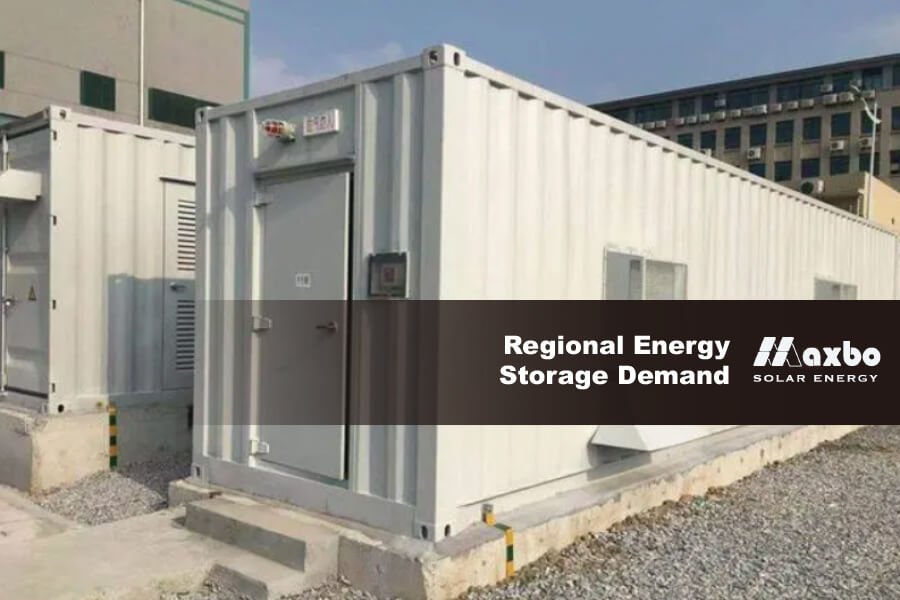At Maxbo, we understand the importance of making informed decisions about your energy investments. If you’re considering integrating an energy storage system with your solar power setup, it’s crucial to understand the energy storage system cost for solar power. In this comprehensive guide, we’ll delve deep into the costs associated with these systems, the factors influencing them, and how to get the best value for your investment. This detailed exploration will help you navigate the financial aspects of energy storage systems and optimize your solar power experience.
Table of Contents
ToggleThe Significance of Energy Storage Systems for Solar Power
Why Energy Storage Systems Matter
When investing in solar power, incorporating an energy storage system can offer numerous advantages:
- Maximize Solar Efficiency: An energy storage system allows you to store excess energy generated by your solar panels for use during non-sunny periods, maximizing the efficiency of your solar power setup.
- Reduce Energy Costs: By storing energy when solar generation is high and using it during peak hours when electricity rates are higher, you can reduce your overall energy costs.
- Increase Energy Independence: Energy storage provides a backup power source, reducing your reliance on the grid and enhancing your energy security.
Understanding these benefits sets the stage for evaluating the energy storage system cost for solar power, ensuring you make an informed decision.
Factors Influencing the Energy Storage System Cost for Solar Power
1. Type of Energy Storage Technology
The cost of energy storage systems varies based on the technology used:
- Lithium-Ion Batteries: These are the most popular choice due to their high energy density, long lifespan, and efficiency. They typically have a higher upfront cost but offer better performance and lower maintenance.
- Lead-Acid Batteries: A more traditional option, these batteries are generally less expensive but have a shorter lifespan and lower efficiency compared to lithium-ion batteries.
- Flow Batteries: Used for larger-scale applications, flow batteries are less common for residential solar power but offer long-term benefits in specific contexts.
The choice of technology will significantly impact the energy storage system cost for solar power.
2. System Size and Capacity
The size and capacity of the energy storage system also influence its cost:
- Small-Scale Systems: Ideal for residential setups, these systems generally cost less but may have lower storage capacity.
- Large-Scale Systems: Suitable for commercial or industrial applications, these systems have a higher upfront cost but offer greater storage capacity and efficiency.
Determining the appropriate size for your needs is crucial in managing the energy storage system cost for solar power effectively.
3. Installation and Integration Costs
The total cost of an energy storage system also includes installation and integration expenses:
- Installation: Costs can vary based on the complexity of the installation and the need for additional equipment or modifications to your existing solar power system.
- Integration: Connecting the energy storage system to your solar panels and electrical setup may involve additional costs for wiring, inverters, and other components.
Understanding these costs will help you accurately estimate the energy storage system cost for solar power.
4. Maintenance and Lifespan
The long-term costs associated with energy storage systems include:
- Maintenance: Regular maintenance is essential for ensuring the optimal performance of your energy storage system. Some systems require more frequent maintenance, which can affect overall costs.
- Lifespan: The lifespan of the storage system impacts its total cost. Systems with longer lifespans generally offer better value despite a higher initial investment.
Evaluating these factors is key to understanding the long-term energy storage system cost for solar power.
Cost Breakdown of Energy Storage Systems for Solar Power
1. Initial Investment
The initial investment is the most significant component of the energy storage system cost for solar power:
- Battery Costs: Depending on the type and capacity, battery costs can vary significantly. Lithium-ion batteries typically range from $500 to $1,000 per kilowatt-hour (kWh), while lead-acid batteries are generally less expensive.
- Inverter Costs: An inverter is required to convert the stored energy into usable power. Costs for inverters can range from $1,000 to $3,000, depending on the system’s capacity and features.
- Installation Costs: Installation costs can vary based on the complexity of the setup and local labor rates. On average, installation can cost between $1,000 and $5,000.
2. Ongoing Costs
Ongoing costs include maintenance, repairs, and potential replacements:
- Maintenance: Regular maintenance is essential for prolonging the life of your energy storage system. Budget for periodic checks and servicing.
- Repairs and Replacements: Over time, components may need repair or replacement. Factor these potential costs into your overall budget.
3. Energy Savings
The energy savings achieved through effective use of your storage system can offset some of the initial costs:
- Reduced Utility Bills: By using stored energy during peak hours, you can reduce your electricity bills and achieve cost savings over time.
- Incentives and Rebates: Explore available incentives and rebates for energy storage systems, which can help reduce the overall cost.
How to Get the Best Value for Your Investment
1. Choose the Right System
Selecting the right energy storage system for your needs is crucial:
- Assess Your Needs: Evaluate your energy consumption patterns and storage requirements to choose a system that offers the best performance and value.
- Compare Options: Compare different technologies and systems to find the best fit for your budget and energy needs.
2. Work with Professionals
Partnering with experienced professionals can help you make informed decisions and optimize your installation:
- Consult Experts: At Maxbo, we offer expert consultations to help you select and install the best energy storage system for your solar power setup.
- Get Multiple Quotes: Obtain quotes from different providers to ensure you get the best deal on your energy storage system.
Maxbo’s Energy Storage Solutions for Solar Power
At Maxbo, we provide a range of high-quality energy storage solutions designed to meet your specific needs:
- Maxbo Lithium-Ion Batteries: Known for their efficiency, durability, and long lifespan, these batteries are an excellent choice for solar power systems.
- Maxbo Hybrid Systems: Our hybrid systems offer flexibility and high performance for both residential and commercial applications.
- Maxbo Installation Services: Our team of experts ensures a seamless installation process, optimizing your energy storage system’s performance.
For more information and to explore our products, visit Maxbo’s website.
Resources and References
For further information on energy storage systems and associated costs, check out these authoritative resources:
- International Renewable Energy Agency (IRENA)
- U.S. Department of Energy – Energy Storage
- European Commission – Energy Storage
- National Renewable Energy Laboratory (NREL)
- Energy Storage Association
- Solar Energy Industries Association (SEIA)
- Renewable Energy World
- Clean Energy Review
- Energy Storage News
- Solar Power Europe
Conclusion
Understanding the energy storage system cost for solar power is essential for making informed decisions about your energy investments. By evaluating the various factors influencing costs, including technology, size, installation, and maintenance, you can ensure that you get the best value for your money. At Maxbo, we are committed to providing you with top-quality products and expert guidance to help you optimize your solar power system. Contact us today to find out how we can assist you in achieving your energy goals.
Related Solutions
Related Blogs
EU Cold Chain BESS Container: Stop €1.2B Food Waste & Slash Emissions for EU Cold Chains
行政2025-12-18T16:23:32+08:00December 17th, 2025|Categories: Design, News|
Grid Virtual Inertia BESS Container Europe: Stabilizing High-Renewable Grids Post-Coal Phase-Out
行政2025-12-18T16:11:18+08:00December 17th, 2025|Categories: Design, News|
Let’s Make Things Happen
Add notice about your Privacy Policy here.
Let’s Make Things Happen
”The Maxbo team of sales consultants will continue to enrich our own expertise and experience to empower the development of sustainable energy with rigor.“
Maxbo CEO
You will need to provide: 1. the amount of electricity used. 2. the type and power of the load. 3. the electricity consumption habits (daytime/nighttime consumption). 4. the need to store electricity. 5. the need to feed electricity to the mains. 6. drawings or address of the installation site. 7. other special requirements
We can provide you with a quotation, a specification for all products, a circuit connection diagram and a diagram of the installation and placement of the PV panels. Any other requirements and adjustments needed can be discussed with our team.
We can meet the needs of most scenarios, whether your application is for domestic, commercial and industrial use, in remote areas, or for grid-level energy storage, we have experienced colleagues to design and deliver the right solution.
Add notice about your Privacy Policy here.
How much solar power do I need?
Most homes need 5–12kW, depending on your energy use and location.
Off-grid vs. grid-tied — what’s the difference?
Off-grid works without the utility grid; grid-tied lets you sell extra power back.
Do I need permits?
Usually yes — check local rules or ask us for guidance.
How long does a battery last?
Depends on size and load. A 5kWh battery can power a fridge for about 40 hours.
Can I upgrade my system later?
Yes, our systems are modular and easy to expand.
Does Maxbo offer installation?
We ship globally and connect customers with trusted local installers.










